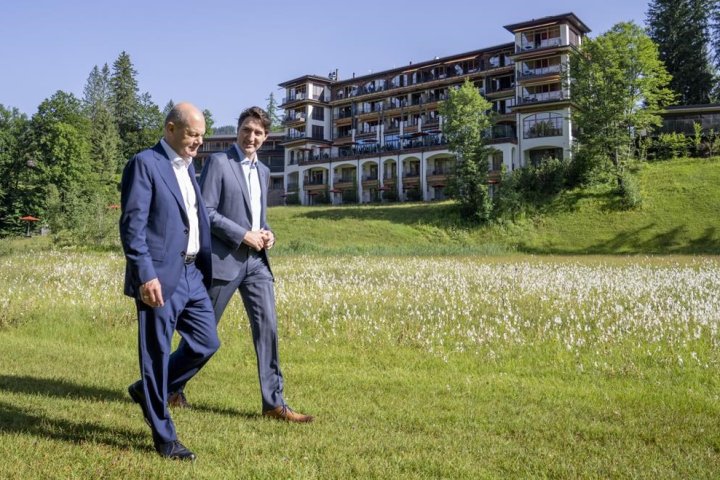Germany’s Olaf Scholz coming to Canada to sign energy deal. Here’s why it matters

German Chancellor Olaf Scholz’s visit to Canada comes during a crucial moment for Germany’s energy future amid Russia’s invasion of Ukraine, allowing Canada an opportunity to help while boosting its own economy.
The centerpiece of the visit — the signing of a months-in-the-making green energy agreement in Newfoundland with Prime Minister Justin Trudeau on Tuesday — will make Germany the first customer of a planned hydrogen production and export facility, the first of its kind in Canada.
While that first shipment is likely years away, the deal will mark a new phase in the relationship between the longtime allies.
That relationship was tested earlier this year when Canada hesitated to return a turbine for a Russian pipeline supplying natural gas to Germany, the Nord Stream 1, that was being repaired in Montreal. The turbine was ultimately returned in July in order to restore the flow of gas, despite sanctions on Russian energy due to the war in Ukraine.
Trudeau and his government faced criticism for the move, which the government has defended as necessary for European gas supply. Jobs and global inflation also factored into the decision, internal government documents revealed this month.
Scholz’s arrival on Sunday in Montreal, where he will be welcomed by Deputy Prime Minister Chrystia Freeland, marks his first visit to Canada since he took over from longtime chancellor Angela Merkel last December.
Trudeau previously met Scholz in Berlin in March and the two leaders held several discussions at the G7 summit in the Bavarian Alps in June.
During the summit, the pair not only discussed the Russian turbine but also the possibility of Canadian hydrogen exports, which Canada had been pitching to Germany and other countries since before Russia invaded Ukraine in February.
Trudeau also spoke more broadly with world leaders at the G7 about how Canada could offer alternatives to Russian oil and gas, which Europe relies on and has been hesitant to limit or ban despite efforts to punish Moscow for the war.
Germany typically gets about half of its natural gas from Russia and is looking for both short- and long-term solutions to wean itself from Russian exports.
At a press conference at the conclusion of the summit, Trudeau suggested infrastructure used to carry liquefied natural gas could be adapted to carry hydrogen, as one example of how Canada could help.
Yet that LNG infrastructure, much like the planned hydrogen facility in Stephenville, N.L., is years away from reality. Construction is underway on the Shell-backed LNG Canada facility in Kitimat, B.C., which is set to open in 2025, and other facilities in Atlantic Canada are still in the planning stages.
The International Institute for Sustainable Development noted in a new report that Canada’s LNG infrastructure will come online “too late” to address Europe’s current needs, and may even prove useless as the world shifts toward energy efficiency and away from fossil fuels.
The Stephenville plant, too, is considered a more long-term solution for Germany’s woes — something Trudeau admitted to Friday during a news conference in Les Iles-de-la-Madeleine, Que.
He said the talks with Germany are playing a longer game to cut reliance on Russia and fossil fuels in general.
“How can we make sure that this illegal Russian invasion and the unreliability of Russia as an energy partner, actually incites and allows us all to pivot, not just off Russian oil and gas more quickly, but to pivot off oil and gas as something we rely on so much,” he said.
Natural Resources Minister Jonathan Wilkinson said Friday the Canada-Germany deal will set aggressive timelines and targets for starting hydrogen exports, and will mark the first step of a long-term collaboration.
“The agreement will be, as you will see, something that essentially sets the framework for collaboration going forward,” Wilkinson said in an interview with The Canadian Press.
“But it will set some targets in terms of timelines around when we would like to see actual product moving from Canada to Germany, and both will be pretty aggressive.”
He said both countries will pledge to to work with the private sector to meet those targets.
Canada’s hydrogen strategy, developed in 2020, seeks to be one of the world’s top-three hydrogen exporters within 30 years. At the moment, the International Renewable Energy Agency doesn’t include Canada on its list of the six places most likely to become hydrogen superpowers.
That distinction goes to China, Europe, Japan, South Korea, the United States and India.
Scholz and Trudeau are also set to discuss their continued solidarity for Ukraine amid Russia’s invasion and European security, according to statements from their respective offices.
The two will meet with Canadian and German business leaders in Montreal and tour a local artificial intelligence institute on Sunday.
They will then head to Toronto, where Trudeau will take part in the virtual summit about Russia’s annexation of Crimea, followed by an appearance at the Canada-Germany Business Forum.
The trip will conclude with the energy pact signing in Stephenville and a visit to a hydrogen trade show.
— with files from the Canadian Press
by Global News







